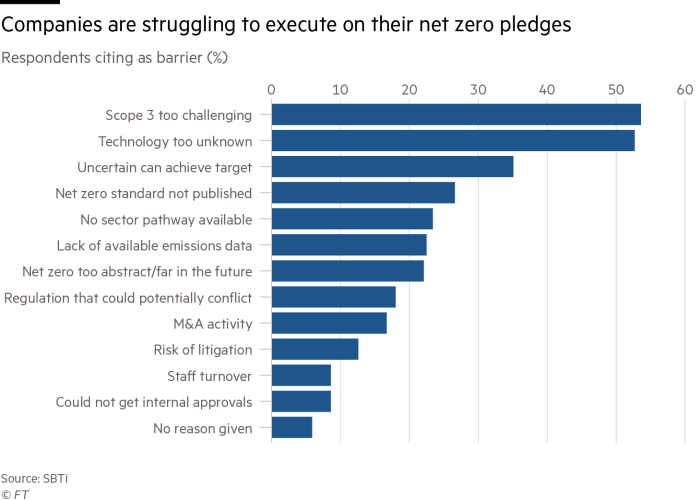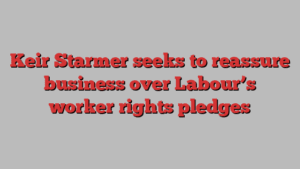
Unlock the Editor’s Digest for free
Roula Khalaf, Editor of the FT, selects her favourite stories in this weekly newsletter.
Not so long ago, companies were falling over themselves to commit to carbon reduction targets. Now, they are jamming the doorway on the way out.
That is one way to read news that 239 groups have failed to provide industry standard-setter SBTi with net zero targets within the agreed 24-month period. That is about a quarter of the cohort that had signed up in the first place: it includes sustainability heavyweights such as Unilever, Procter & Gamble, Microsoft, Walmart and Diageo, as well as Iberia and easyJet. Separately, Shell on Thursday nudged down a target on the carbon intensity of its products.
This wave of corporate backsliding is not quite as bad as it sounds. Shell’s lowered target reflects the divestment of its European energy retail business, and with it the reduction in expected power sales. The oil major has made progress on its 2030 targets and introduced a new pledge to cut emissions from oil products.
And, of course, many SBTi laggards say they remain committed to the cause. Some, such as Unilever, have set a 2050 net zero target; it is in the process of being validated by SBTi. Others, such as Diageo, are working on it.
But many have chosen to focus efforts on the near term — setting targets to 2030, rather than 2050 — and on their own emissions, rather than those of their suppliers and customers (known as scope 3) as required by SBTi’s guidelines.

It is not hard to see why. 2050 is well beyond companies’ typical three-to-five -year planning cycle. Airlines can get to zero only if hydrogen-based fuels — currently but a twinkle in forecasters’ eyes — take off. And making a solid commitment to cut carbon from one’s value chain is tricky: suppliers are independent companies that may not have signed up to net zero themselves. Indeed, the SEC recently ditched proposals to force US companies to report scope 3 emissions.
All this self-justifying pragmatism falls well short of what is required. Without net zero targets, companies run the risk of prioritising investment in technologies that lower emissions, rather than eliminate them. Scope 3 targets force the value chain collaboration needed to scale up the production of clean materials such as green steel.
Aspirational climate leadership — otherwise known as setting targets that one has no idea how to reach — is not as daft as it sounds. It creates momentum and helps get the ball rolling.
But that aspiration is now colliding with reality. Those who trumpeted their green credentials most loudly will take a hit.

